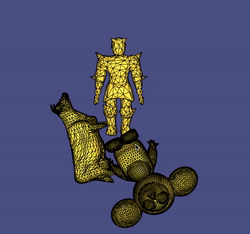
Here's a minimal example showing how to launch background computation threads for each mesh in a list of meshes. Meanwhile the main thread runs a mesh viewer with all meshes concatenated into one huge multi-component mesh. Whenever a computation thread signals that an update to the mesh needs to be made, the main thread will re-concatenate the meshes and update the viewer. In this example, the "computation" is determining how much to move a clock "hand" (random mesh).
Here's the program running on the cow, cheburashka and knight models:
// Tiny example to demonstrate spawning a background computation thread for
// each mesh in a list and update the viewer when computation results in a
// change to (one of) the meshes.
//
// In this example, three meshes are read in and interpreted as "hands" of a
// clock. The "computation" is just a busy-wait until the hand should move
// (after one second, one minute, one hour). This is, of course, a terrible way
// to implement a clock.
//
// ./test libigl/tutorial/shared/{cow.off,cheburashka.off,decimated-knight.off}
#include <igl/read_triangle_mesh.h>
#include <igl/point_mesh_squared_distance.h>
#include <igl/combine.h>
#include <igl/viewer/Viewer.h>
#include <Eigen/Geometry>
#include <thread>
int main(int argc, char * argv[])
{
using namespace std;
using namespace Eigen;
// Read in k meshes (<=3 will be used)
std::vector<Eigen::MatrixXd> VV(argc-1);
std::vector<Eigen::MatrixXi> FF(argc-1);
for(int i = 1;i<argc;i++)
{
igl::read_triangle_mesh(argv[i],VV[i-1],FF[i-1]);
VV[i-1].col(0).array() -= VV[i-1].col(0).mean();
VV[i-1].col(1).array() -= VV[i-1].col(1).minCoeff();
}
bool continue_computing = true;
// Flag to redraw and mutex to guard it
bool redraw = false;
std::mutex m;
// After waiting `tic` seconds, rotate `V` by `deg` degrees
const auto rot = [&continue_computing,&redraw,&m](
const double tic, const double deg, Eigen::MatrixXd& V)
{
while(continue_computing)
{
// Let's watch this at 500x: Real clocks are slow.
std::this_thread::sleep_for(std::chrono::milliseconds((int)tic*5));
V *= Eigen::AngleAxisd(deg/180.*igl::PI,
Eigen::Vector3d(0,0,1)).toRotationMatrix();
{
std::lock_guard<std::mutex> lock(m);
redraw = true;
}
}
};
// Launch background "computation" threads for each "hand" of the clock
// std::ref is important, otherwise std::bind passes by copy
std::vector<std::thread> threads;
switch(VV.size())
{
case 3:
threads.emplace_back(std::bind(rot,60.*60.,30,std::ref(VV[2])));
case 2:
threads.emplace_back(std::bind(rot,60.,6,std::ref(VV[1])));
case 1:
threads.emplace_back(std::bind(rot,1.,6,std::ref(VV[0])));
default: break;
}
igl::viewer::Viewer v;
v.data.clear();
// Helper function to view k meshes
const auto & set_meshes = [](
const std::vector<Eigen::MatrixXd> & VV,
const std::vector<Eigen::MatrixXi> & FF,
igl::viewer::Viewer & v)
{
Eigen::MatrixXd V;
Eigen::MatrixXi F;
igl::combine(VV,FF,V,F);
v.data.set_mesh(V,F);
};
set_meshes(VV,FF,v);
// Continuous draw loop. TODO: trigger draws using glfwPostEmptyEvent
v.core.is_animating = true;
// Before every draw check if the meshes have changed.
v.callback_pre_draw =
[&redraw,&m,&VV,&FF,&set_meshes](igl::viewer::Viewer & v)->bool
{
if(redraw)
{
set_meshes(VV,FF,v);
{
std::lock_guard<std::mutex> lock(m);
redraw = false;
}
}
return false;
};
v.launch();
// Tell computation threads to stop
continue_computing = false;
// Join with computation threads: return to serial main thread.
for(auto & t : threads) if(t.joinable()) t.join();
}

This is pretty hacky, but it will allow me to use the standard libigl viewer for making comparisons of mesh-editing methods whose performances are very different.